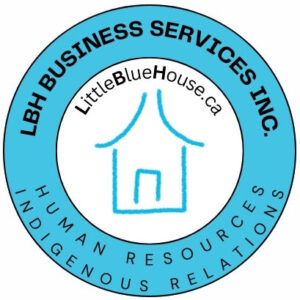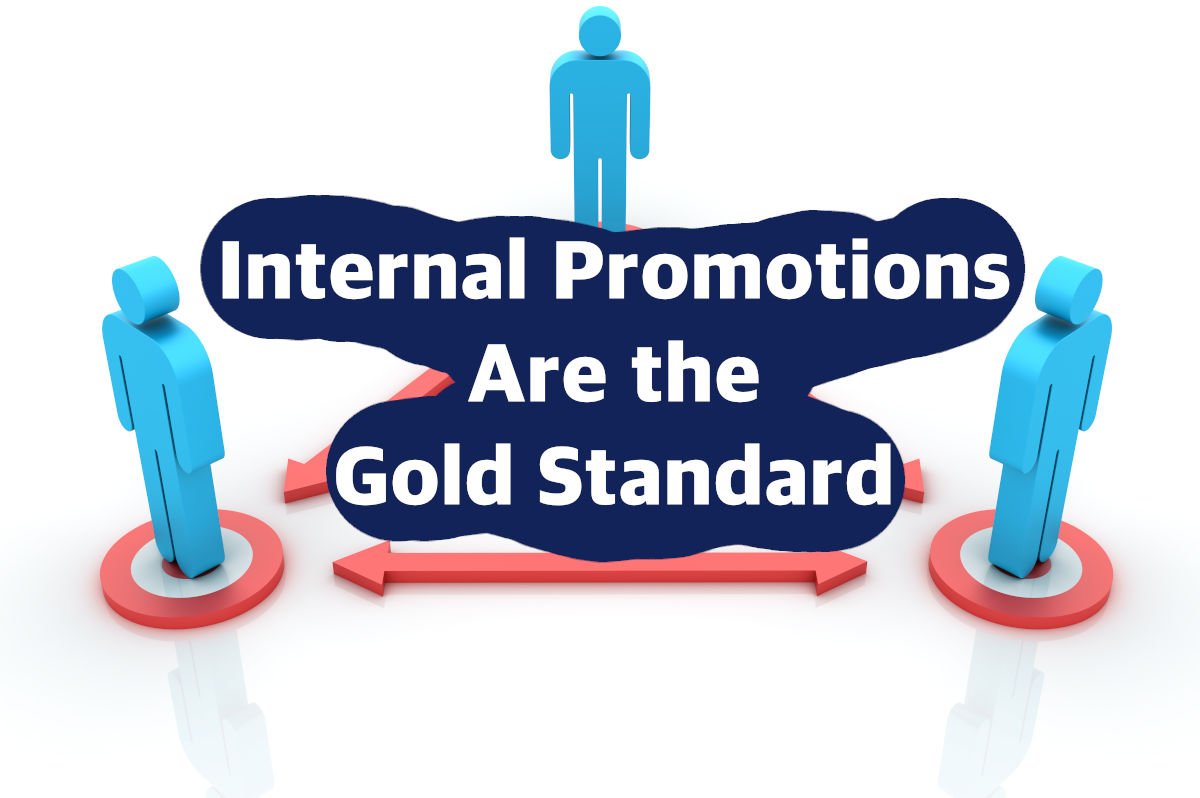Internal promotions are the gold standard for employee needs because they create loyalty, trust, and career advancement opportunities while lowering employee animosity toward hiring an outsider. Proper training is the key to making internal promotions work.
In my previous article, “The Hierarchy of Employee Needs ,” I wrote about employee self-fulfillment needs. The self-actualization employees need for internal promotions signifies a great organization and employer.
,” I wrote about employee self-fulfillment needs. The self-actualization employees need for internal promotions signifies a great organization and employer.
Employee Loyalty
Promotions can be the ultimate way to show appreciation to a hard-working employee. If you have a standard practice to only promote from within, employees will be grateful that they don’t have to do a job search every few years.
If employees know they will get a chance at a promotion in a few years as senior team members retire, they will stick around. Internal promotions will create loyalty with employees, especially your top performers.
Employee loyalty is not just about tenure; it’s also about feeling valued and having opportunities for growth within the organization. When employees see a clear path for advancement through internal promotions, turnover is reduced. This fosters a sense of dedication and commitment. This loyalty is extreme among top performers motivated by the prospect of moving up the ladder based on their skills and contributions.
Moreover, promoting from within sends a positive message about the company’s culture, emphasizing meritocracy and investing in its employees’ long-term success. As a result, employees are more likely to engage in continuous learning and development, enhancing their skills and overall performance, which benefits the organization.
Click here to check out the top books on employee loyalty on Amazon.
on Amazon.
Employee Trust
If an internal promotions policy is in place long enough, it will help the employees trust the organization more. It must be around for a long time, as with all policies or programs. If good policies are only around for a few months, then rescinded trust will be lost.
An organization can’t put itself in a position where employees don’t trust senior leaders and managers. Internal promotions are a powerful tool for all the reasons in this article that all organizations should move in that direction.
Employee trust is the cornerstone of a healthy and productive work environment. Internal promotions implemented over an extended period contribute significantly to building trust between employees and the organization. This trust is not just about the promotion itself but also about the transparency and fairness of the promotion process.
Employees must believe promotions are based on merit and performance rather than favouritism or bias. A longstanding internal promotions policy demonstrates the organization’s commitment to fairness, equity, and career development opportunities, reinforcing employees’ trust in senior leaders and managers.
This trust forms the basis of a solid employee-employer relationship, leading to higher morale, increased job satisfaction, and, ultimately, better organizational performance.
For some book ideas on employee trust on Amazon, click here !
!
Career Advancement Opportunities
Good pay and new challenges drive top performers or your rock star employees. If your top performers can’t see a future at your organization, they will leave.
Losing top performers can be a significant damaging blow to an organization. As we know, 20% of employees do 80% of the work, so you can’t afford to lose a top performer. Give them career advancement opportunities in-house so they don’t consider leaving the house.
Career advancement opportunities are pivotal in retaining top talent within an organization. Beyond competitive pay and engaging work, top performers are driven by the prospect of career growth and development. Providing clear pathways for advancement within the company motivates these employees to stay. It ensures that their skills and expertise continue to benefit the organization.
Losing a top performer can have significant repercussions, considering their outsized contribution to productivity and innovation. Organizations can cultivate a culture of loyalty and commitment among top talent by offering in-house career advancement opportunities, ultimately fostering a more resilient and prosperous workforce.
This proactive approach also signals employees that their hard work and dedication are recognized and rewarded within the company, further strengthening their engagement and retention.
Lowers Employee Animosity
Imagine you didn’t get the promotion, and the organization hired an outside person for that role. This might be okay if they have better education and more experience, are friendly, and you can learn from them.
Now, imagine that you’ve been assigned to train your boss! Because your new boss needs to gain organizational knowledge, you must spend the next six months training them. Any current employees in this position will become disgruntled and may start looking for a new job.
Creating disgruntled employees can be avoided if your organization takes on the policy of giving internal promotions first. In this model, the organization concentrates on finding new entry-level employees only and spends resources on training for promotions.
Implementing a policy of prioritizing internal promotions can significantly reduce employee animosity within an organization. When employees see that promotions are primarily given to internal candidates who have demonstrated dedication and capability, it fosters a sense of fairness and equity. This approach helps mitigate resentment when external candidates are hired for higher positions, especially if existing employees feel they are equally or more qualified.
By promoting from within, organizations recognize and reward their current employees’ efforts and send a positive message about investing in talent development and internal growth opportunities. This proactive strategy lowers employee turnover and contributes to a more harmonious and motivated workforce, ultimately benefiting organizational culture and performance.
Proper Training is Key
Proper training is the key to making internal promotions work because how else will employees get team lead, supervisor, or manager skills? Being a salesperson is different from being a sales manager. Even moving from a salesperson to a senior salesperson role needs training in handling more prominent clients and deals.
You must prepare your team for these promotions if they want them. This will allow you to only worry about hiring entry-level employees and not waste resources on executive search or headhunting fees for senior roles.
Proper training is crucial in preparing employees for internal promotions, especially as they transition into leadership or managerial roles. Skills such as team management, conflict resolution, decision-making, and strategic planning are essential for success in higher positions. Still, they may need to be more inherently developed in their current roles.
By providing targeted training programs, organizations can ensure that employees have the necessary skills and knowledge to (Source: Chipunza, Crispen, and Shungu A. Gwarinda. “Transformational Leadership in Merging Higher Education Institutions: A Case Study.” SA Journal of Human Resource Management, 2010,. ) excel in their new roles. This benefits the individuals seeking promotion and enhances overall team performance and organizational effectiveness.
Moreover, investing in internal training programs reduces the need for external hiring for senior roles, saving resources that can be directed toward other strategic initiatives and development opportunities for existing employees.
What Next?
You need to examine your organizational structure and determine which positions seem like a natural progression of a typical career. Then, identify the promotions or lateral moves needed and design training that will help employees make these moves.
Additionally, identify your entry-level positions, then create an appropriate hiring process for these roles.
Learn to be a good boss by reading some of these books on Amazon!
on Amazon!
For human resources support in Canada, click here to book a free HR needs assessment now. If you’re on a budget, consider joining my Patreon to ask unlimited HR questions. If you need HR advice sooner, book a consultation via Fiverr here.
HR questions. If you need HR advice sooner, book a consultation via Fiverr here.


